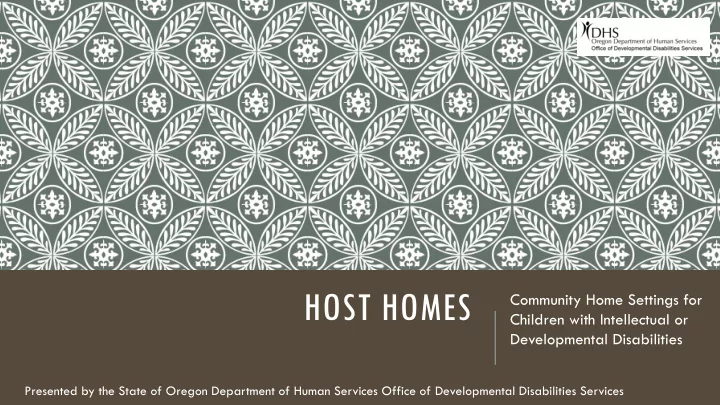

HOST HOMES Community Home Settings for Children with Intellectual or Developmental Disabilities Presented by the State of Oregon Department of Human Services Office of Developmental Disabilities Services
WHAT ARE HOST HOMES? Host Homes are a new type of residential service setting to support children with intellectual or developmental disabilities Host Homes provide intensive services to children living in a licensed family home setting
HOST HOMES ARE SETTINGS LICENSED BY ODDS There are essentially three steps for a Host Home to be licensed to serve children. ODDS licensing is the authority that grants certification, endorsement, and licensing to the Host Home provider agencies and settings. ODDS licenses the Host ODDS endorses the Home with the agency ODDS certifies the provider agency to as the provider and provider agency provide services in Host responsible party for Home Settings the home
THE THREE COMPONENTS OF LICENSING FOR HOST HOMES Licensed Host Home Endorsed to provide Certified Agency services in a Host Licensed Host Home Home setting Licensed Host Home
HOST HOMES HAVE THEIR OWN SET OF OREGON ADMINISTRATIVE RULES (OARS) Chapter 411, Division 348 The 411-348 OAR set standards for the Host Home Settings, including standards for: Caregivers The Home Environment How Care is Delivered
HOW DOES THE STRUCTURE OF A HOST HOME WORK? The Host Home agency takes on the task of recruiting families to open their homes to children with intellectual and developmental disabilities who are in need of a highly structured out-of-home placement. Host Home settings are private, single family community homes owned or rented by the head(s) of the household. The head(s) of the household who live in the home as their primary residence and act in the parental role are called “in - residence caregivers”.
HOST HOME AGENCIES ARE RESPONSIBLE FOR THE HOME SETTING The “in -residence The license caregiver” is is issued to identified in the the Host application the Host Home Home agency agency submits to have the home licensed
CHILDREN SERVED IN HOST HOMES Host Homes may serve 1-2 children with intellectual and developmental disabilities The children served in Host Homes will likely have intensive behavior support needs that require more structure and intensive support than may be available in their family home or foster home setting.
The Host Home provides support to the child, caregivers, and home setting through: THE HOST HOME Training AGENCY Staffing SUPPORTS THE IN-RESIDENCE Respite Care CAREGIVER AND HOUSEHOLD Coaching Resource identification
HOST HOME FUNDING Services delivered by a Host Home agency in a Host Home are funded through: The K-plan (Medicaid Oregon State Community & First Choice general (CFC) state funds plan)
THE SERVICE COMPONENTS INCLUDED IN THE HOST HOME SERVICE SETTING RATE ARE: Attendant Care • ADL/IADL/Health- Related Tasks • Skills Training • Behavior Support Specialized Community Services Transportation
Professional Behavior Services CHILDREN SUPPORTED IN HOST HOMES MAY Direct Nursing Services BE ELIGIBLE FOR ADDITIONAL Ancillary Services DISCRETE SERVICES BASED ON THE CHILD’S Employment-Related Services INDIVIDUAL SUPPORT NEEDS The child and their guardian have a choice of qualified, available providers, including a provider other than the Host Home agency, for these services
Host Homes operate under rules similar to 24-Hour Residential Program settings (Group Homes) serving children. The Host Home OAR (411-348) mirrors the number conventions, layout, and contents of the 24-Hour Residential Programs OAR (411-325) THE SERVICES AND SUPPORT A CHILD RECEIVES IN A HOST HOME SETTING ARE VERY Host Homes can look and feel much SIMILAR TO OTHER RESIDENTIAL SETTINGS like a foster home setting with foster parents (the in-residence caregiver) who live in the home and provide the bulk of the child’s care.
Depending on the child’s need for stabilization… Host Homes are intended to provide a structured environment to support a child in building the skills and developing strategies to help the child live successfully in a less restrictive community setting such as returning HOST HOMES CAN BE A SHORT to the child’s family home or a foster home TERM OR LONG TERM PLACEMENT placement
With the goal of every child The Host Home program is placed in a Host Home setting required to help support the being one of reunification with the child’s relationship with their child’s family or a less restrictive family . placement such as foster care, The intention is that Host Homes will be located in the child’ s home community to allow the child as much continuity in community services, in addition to access to their families as possible. HOST HOME PROGRAMS SUPPORT A CHILD’S RELATIONSHIP WITH THEIR FAMILY
Recommend
More recommend